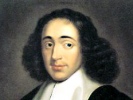
Sacred Texts Philosophy Spinoza Index Previous Next
Buy this Book at Amazon.com


Correspondence, by Benedict de Spinoza, [1883], at sacred-texts.com
[The writer exhorts Spinoza to publish the treatises on Ethics and on the Improvement of the Understanding.—Remarks on the definition of motion. On the difference between a true and an adequate idea.]
Most excellent Sir,—When shall we have your method of rightly directing the reason in the acquisition of unknown truths, and your general treatise on physics? I know you have already proceeded far with them. The first has already come to my knowledge, and the second I have become aware of from the Lemmas added to the second part of the Ethics; whereby many difficulties in physics are readily solved. If time and opportunity permit, I humbly beg from you a true definition of motion and its explanation; also to know how, seeing that extension in so far as it is conceived in itself is indivisible, immutable, &c., we can infer à priori, that there can arise so many varieties of it, and consequently the existence of figure in the particles of any given body, which are, nevertheless, in every body various, and distinct from the figures of the parts, which compose the reality of any other body. You have already, by word of mouth, pointed out to me a method, which you employ in the search for truths as yet unknown. I find this method to be very excellent, and at the same time very easy, in so far as I have formed an opinion on it, and I can assert that from this single discovery I have made great progress in mathematics. I wish therefore, that you would give me a true definition of an adequate, a true, a false, a fictitious, and a doubtful idea. I have been in search of the difference between a true and an adequate idea. Hitherto, however, I can ascertain nothing except after inquiring into a thing, and forming a certain concept or idea of it. I then (in order to elicit whether this true idea is also an adequate idea of its object) inquire,
what is the cause of this idea or concept; when this is ascertained, I again ask, What is the cause of this prior concept? and so I go on always inquiring for the causes of the causes of ideas, until I find a cause of such a kind, that I can not find any cause for it, except that among all the ideas which I can command this alone exists. If, for instance, we inquire the true origin of our errors, Descartes will answer, that it consists in our giving assent to things not yet clearly perceived. But supposing this to be the true idea of the thing, I nevertheless shall not yet be able to determine all things necessary to be known concerning it, unless I have also an adequate idea of the thing in question; in order to obtain such, therefore, I inquire into the cause of this concept, how it happens that we give assent to things not clearly understood—and I answer, that it arises from defective knowledge. But here I cannot inquire further, and ask what is the cause, that we are ignorant of certain things; hence I see that I have detected an adequate idea of the origin of our errors. Here meanwhile I ask you, whether, seeing that many things expressed in infinite modes have an adequate idea of themselves, and that from every adequate idea all that can be known of its object can be inferred, though more readily from some ideas than others, whether, I say, this may be the means of knowing which idea is to be preferred? For instance, one adequate idea of a circle consists in the equality of its radii; another adequate idea consists in the infinite right angles equal to one another, made by the intersection of two lines, &c., and thus we have infinite expressions, each giving the adequate nature of a circle, Now, though all the properties of a circle may be inferred from every one of them, they may be deduced much more easily from some than from others. So also he, who considers lines applied to curves, will be able to draw many conclusions as to the measurement of curves, but will do so more readily from the consideration of tangents, &c. Thus I have wished to indicate how far I have progressed in this study; I await perfection in it, or, if I am wrong on any point, correction; also the definition I asked for. Farewell.
5 Jan., 1675.
393:1 This letter is from Tschirnhausen, who had in the meantime, as appears from its contents, had an interview with Spinoza.